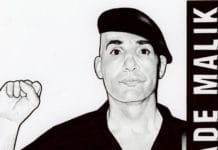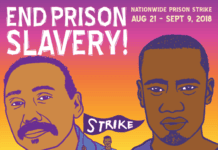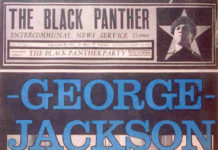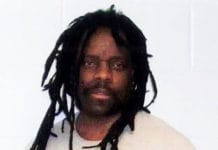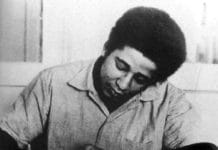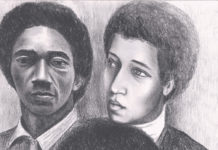Commemorating the 42nd anniversary of the Marin Courthouse Slave Rebellion
by Jonathan Jackson Jr.

During George’s numerous trial appearances for the Soledad Brothers case, Mom would lift me above the crowd so he could see me. Consistently, we would receive a letter a few days later. For a single mother with son, alone and in the middle of both controversy and not a little unwarranted trouble with the authorities, those messages of strength were no doubt instrumental in helping her carry on. No matter how oppressive his situation became, George always had time to lend his spirit to the people he cared for.
A year and two weeks after the revolutionary takeover in Marin, George was ruthlessly murdered by prison guards at San Quentin. Both he and my father left me a great deal: pride, history, an unmistakable name. My experience has been at once wonderful and incredibly difficult. My life is not consumed by the Jackson legacy, but my charge is an accepted and cherished piece of my existence. It is out of my responsibility to my legacy that I have come to write this foreword to my uncle’s prison writings.
During George’s numerous trial appearances for the Soledad Brothers case, Mom would lift me above the crowd so he could see me.
Today I read my inherited letters often those written from George to my mother with a dull pencil on prison stationery. They are things of beauty, my most valuable possessions: passionate pieces of writing that have few rivals in the modern era. They will remain unpublished. However, the letters of “Soledad Brother” demonstrate the same insight and eloquence. The way George’s writings make his personal experience universal is the mainstay of his brilliance.
When this collection of letters was first released in 1969, it brought a young revolutionary to the forefront of a tempest, a tempest characterized by the Black Power, free speech and antiwar movements, accompanied by a dissatisfaction with the status quo throughout the United States. With unflinching directness, George Jackson conveyed an intelligent yet accessible message with his trademark style, rational rage.
He illuminated previously hidden viewpoints and feelings that disenfranchised segments of the population were unable to articulate: the poor, the victimized, the imprisoned, the disillusioned. George spoke in a revolutionary voice that they had no idea existed. He was the prominent figure of true radical thought and practice during the period, and when he was assassinated, much of the movement died along with him.
But George Jackson cannot and will not ever leave. His life and thoughts serve as the message. George himself is the revolution.
George himself is the revolution. His life and thoughts serve as the message.
The reissue of “Soledad Brother” at this point in time is essential. It appears that the ‘90s are going to be a telling decade in U.S. history. The signposts of systemic breakdown are as glaringly obvious as they were in the ‘60s: unrest manifesting itself in inner-city turmoil, widespread rise of violence in the culture, and international oppression to legitimize a state in crisis. The fact that imprisonments in California have more than tripled over the last decade, supported by the public, is merely one sign of societal decomposition.

Over the past 25 years, why has George Jackson not been an integral part of mainstream consciousness? He has been and still is underexposed, reduced to simplistic terms and ultimately misunderstood. Racial and conspiracy theory aside, there are rational reasons for his exclusion. They stem not only from the hard-line revolutionary aspects of George’s philosophy, but more importantly from the nature of the political system that he existed in and under.
Howard Zinn has pointed out in “A People’s History of the United States” that “the history of any country, presented as the history of a family, conceals fierce conflicts of interest (sometimes exploding, most often repressed) between conquerors and conquered, masters and slaves, capitalists and workers, dominators and dominated.” U.S. history is essentially that type of hidden history.
Without denying important mitigating factors, the United States of today is strongly linked to the values and premises on which it was founded. That is, it is a settler colony founded primarily on two basic pillars, upheld by the Judeo-Christian tradition: genocide of indigenous peoples and slave labor in support of a capitalist infrastructure. Although the Bible repeatedly exalts mass slaughter and oppression, Judeo-Christian morality is publicly held to be inconsistent with them. This dissonance, evident within the nation’s structure from the beginning, informs the state’s first function: to oversimplify and minimize immoral events in order to legitimize history and the state’s very existence simultaneously.
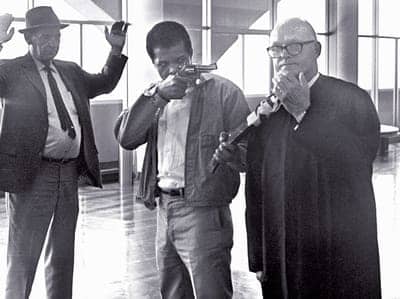
Protestant Calvinism provided a set of ethics that fit perfectly with the colonists’ conquests. Max Weber, in his definitive study on religion, “The Sociology of Religion,” wrote, “Calvinism held that the unsearchable God possessed good reasons for having distributed the gifts of fortune unevenly”; it “represented as God’s will, [the Calvinists’] domination over the sinful world.
Clearly this and other features of Protestantism, such as its rationalization of the existence of a lower class, 1 were not only the bases for the formation of the United States, but still prominently exist today. “One must go to the ethics of ascetic Protestantism,” Weber asserts, “to find any ethical sanction for economic rationalism and for the entrepreneur.” When a nation can’t admit to the process through which it builds hegemony, how can anything but delusion be a reality? “The monopoly of truth, including historical truth,” stated Daniel Singer in a lecture at Evergreen State College (Washington) in 1987, “is implied in the monopoly of power.”
“The monopoly of truth, including historical truth,” stated Daniel Singer in a lecture at Evergreen State College (Washington) in 1987, “is implied in the monopoly of power.”
Clearly, objective history is an impossibility. This understood, the significant problem lies in how the general population defines the term: History implies that truth is being told. It is an unfortunate fact that history is unfailingly written by the victors, which in the case of the United States are not only the original imperialists, but the majority of the “founding fathers,” dedicated to uniting and strengthening the existing mercantile class among disjointed colonies. There can be no doubt that from the creation of this young nation, history as a created and perceived entity moved further and further away from the objective ideal. Genocide, necessary for “the development of the modern capitalist economy,” according to Howard Zinn, was rationalized as a reaction to the fear of Indian savages. Slavery was similarly construed.
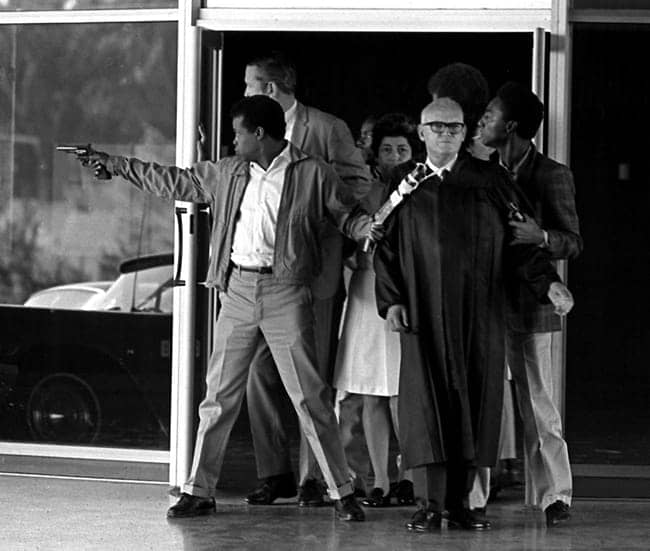
A few tidbits, factual or not, incomplete and selective, are used to describe the entirety of a person’s existence. They become part of mainstream consciousness. We therefore know that Lincoln freed the slaves, Malcolm X was a Black extremist, and Hitler was solely responsible for World War II and the Holocaust. All half-truths go unexplained, all fallacies go unchallenged, as they appear to make perfect sense to the everyday, noncritically thinking American. The paradox has been created: The more famous a person becomes, the more misunderstood he or she is. This accepted occurrence is incredibly counterintuitive: The public should know more, not less, about a noteworthy individual and the sociopolitical dynamics surrounding him or her.
Genocide, necessary for “the development of the modern capitalist economy,” according to Howard Zinn, was rationalized as a reaction to the fear of Indian savages. Slavery was similarly construed.
This historical mythicization is not, for the most part, a consciously created phenomenon. The media don’t go out of their way to mislead the public by constructing false heroes and emphasizing the mundane. Fewer “dimly lit conferences” take place than conspiracy theorists believe. It is the existing political system that is responsible for the information that reaches the general public. The state’s control of information created the system, and it continually re-creates it. Propagated by schooling and the media, information that reaches the public is subject to three chief mechanisms of state control: denial, self-censorship and imprisonment.
Denial is the easiest control mechanism and therefore the most common. If events do not follow the state’s agenda or its ecumenical ideology and might bring unrest, they are denied. Examples are plentiful: prewar state terrorism against the people of North and South Vietnam and later the bombing of Cambodia; government funding and military aid to the Nicaraguan Contras; and support of UNITA and South Africa in the virtual destruction of Angola, among many others.
Denial goes hand in hand with self-censorship. The media emphasize certain personal characteristics and events and de-emphasize others, in a pattern that supports U.S. hegemony. The information that reached the public after the U.S. invasion of Panama in 1989 is telling. It was not until much later, after the heat of controversy, that the average citizen had access to the scope of the devastation. The effectiveness of self-censorship in this case was maximized, as the full details of the Panama invasion were patchwork for years.
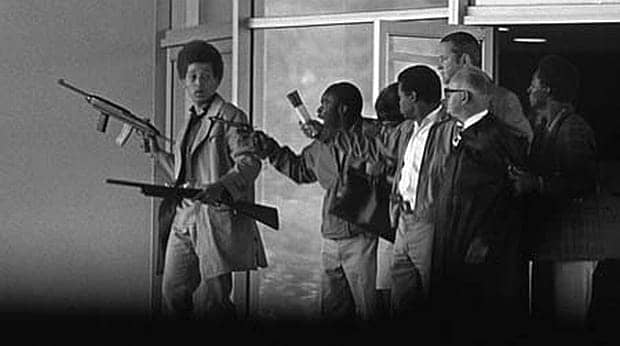
Denial and self-censorship create a comfort zone for the U.S. citizenry, generally uncritical and willing to accept digestible versions of historical personalities and world events. The reasoning behind denial and self-censorship: Do not make the public uncomfortable, even if that means diluting, sensationalizing or lying about the truth.
Ultimately, when denial and self-censorship may not be sufficient for control of information, the state resorts to imprisonment. All imprisonment is political and as such all imprisonments carry equal weight. Society does, however, distinguish two categories of imprisonment: one for breaking a law, the other for political reasons. A difference is clear: American Indian Movement leader Leonard Peltier, serving a federal sentence for his supposed role at Wounded Knee, is considered a different type of prisoner than an armed robber serving a five-to-seven-year sentence.
State policy reflects institutional needs. When the state as an institution cannot tolerate an outside threat, real or perceived, from an individual or group, the consequences at its command include isolation, persecution and political imprisonment. All may occur in greater or lesser form, depending on the degree of threat.
Nothing is more dangerous to a system that depends on misinformation than a voice that obeys its own dictates and has the courage to speak out. George Jackson’s imprisonment and further isolation within the prison system were clearly a function of the state’s response to his outspoken opposition to the capitalist structure.
Political incarceration removes threats to the political and economic hegemony of the United States. Even though in 1959 George Jackson initially went to prison as an “everyday lawbreaker” with a one-year-to-life sentence, it was his political consciousness that kept him incarcerated for 11 years. In 1970, George wrote:
“International capitalism cannot be destroyed without the extremes of struggle. The entire colonial world is watching the Blacks inside the U.S., wondering and waiting for us to come to our senses. Their problems and struggles with the Amerikan monster are much more difficult than they would be if we actively aided them. We are on the inside. We are the only ones (besides the very small white minority left) who can get at the monster’s heart without subjecting the world to nuclear fire. We have a momentous historical role to act out if we will. The whole world for all time in the future will love us and remember us as the righteous people who made it possible for the world to live on. If we fail through fear and lack of aggressive imagination, then the slaves of the future will curse us, as we sometimes curse those of yesterday. I don’t want to die and leave a few sad songs and a hump in the ground as my only monument. I want to leave a world that is liberated from trash, pollution, racism, nation-states, nation-state wars and armies, from pomp, bigotry, parochialism, a thousand different brands of untruth, and licentious usurious economics.”
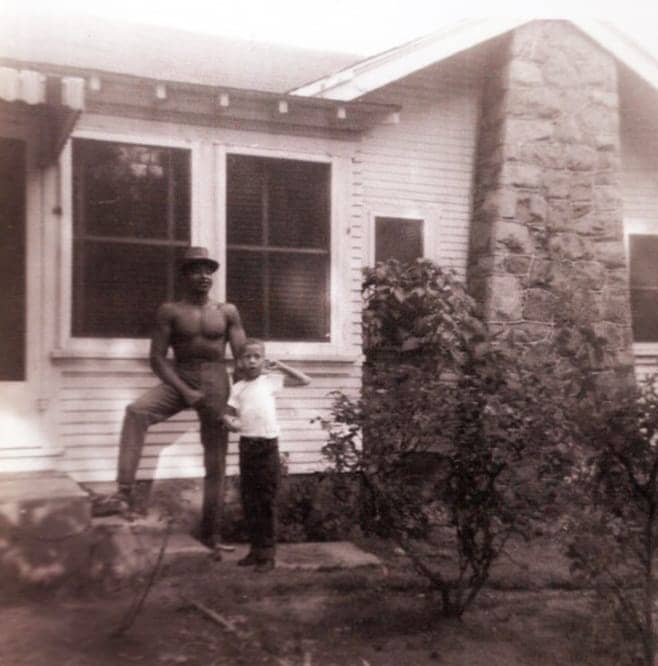
Political incarceration is a tangible form of state control. Unlike denial and self-censorship, imprisonment is publicly scrutinized. Yet public reaction to political incarceration has been minimal. The U.S. government claims it holds no political prisoners (denial), while any notice given to protests focused on political prisoners invariably takes the form of a human interest story (self-censorship).
The efficacy of political incarceration in the United States cannot be denied. Prison serves not only as a physical barrier, but a communication restraint. Prisoners are completely ostracized from society, with little or no chance to break through. Those few outside who might be sympathetic are always hesitant to communicate or protest past a certain point, fearing their own persecution or imprisonment. Also, deep down most people believe that all prisoners, regardless of their individual situations, really did do something “wrong.” Added to that prejudice, society lacks a distinction between a prisoner’s actions and his or her personal worth; a bad act equals a bad person.
The bottom line is that the majority of people simply will not believe that the state openly or covertly oppresses without criminal cause. As Daniel Singer asked at the Evergreen conference in 1987, “Is it possible for a class which exterminates the native peoples of the Americas, replaces them by raping Africa for humans it then denigrates and dehumanizes as slaves, while cheapening and degrading its own working class – is it possible for such a class to create a democracy, equality and to advance the cause of human freedom? The implicit answer is, ‘No, of course not.’”
How does a person inside or outside prison confront the cultural mindsets, the layers of misinformation propagated by the capitalist system? Sooner or later, what can be called the “radical dilemma” surfaces for the few wanting to enter into a structural attack/analysis of the United States. Culturally, educationally and politically, all of us are similarly limited by these layers of misinformation; we are all products of the system. None of us functions from a clean slate when considering or debating any issue, especially history as it pertains to the United States.
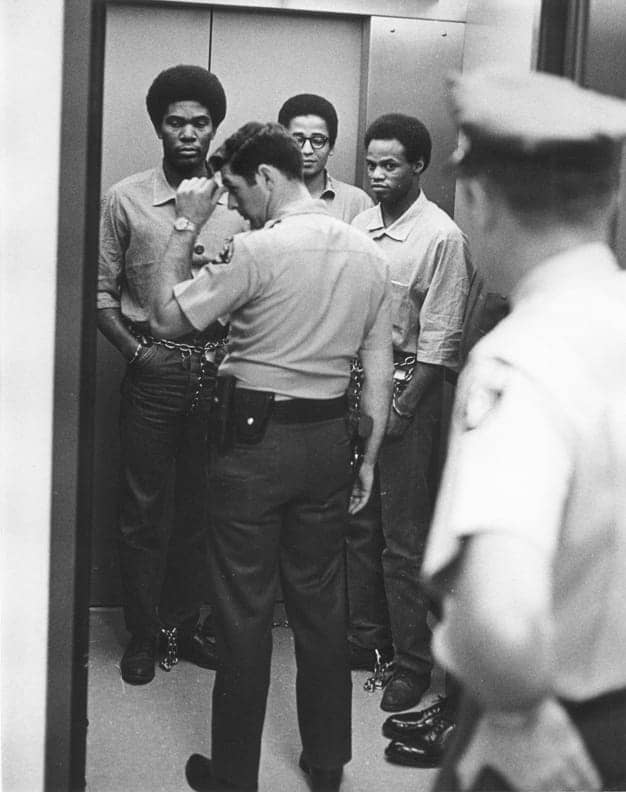
“I’m in a unique political position. I have a very nearly closed future, and since I have always been inclined to get disturbed over organized injustice or terrorist practice against the innocents wherever, I can now say just about what I want (I’ve always done just about that), without fear of self-exposure. I can only be executed once.”
George was equally aware that revolutionary change happens only when an entire society is ready. No amount of action, preaching or teaching will spark revolution if social conditions do not warrant it. My father’s case, unfortunately, is an appropriate indicator. He attempted a revolutionary act during a reactionary time; elimination was the only possible consequence.
Is it possible for a class which exterminates the native peoples of the Americas, replaces them by raping Africa for humans it then denigrates and dehumanizes as slaves, while cheapening and degrading its own working class – is it possible for such a class to create a democracy, equality and to advance the cause of human freedom?
The challenge for a radical in today’s world is to balance reformist tendencies (political liberalism) and revolutionary action/ideology (radicalism). While reformism entails a legitimation of the status quo as a search for changes within the system, radicalism posits a change of system. Because revolutionaries are particularly vulnerable, a certain degree of reformism is necessary to create space, space needed to begin the laborious task of making revolution.
George’s statement “Combat Liberalism” and the general reaction to it typify the gulf between the two philosophies. George was universally misunderstood by the left and the right alike. As is the case with most modern political prisoners, nearly all of his support came from reformists with liberal leanings. It seems that they acted in spite of, rather than because of, the core of his message.
The left’s attitude toward COINTELPRO is a useful illustration. COINTELPRO, the covert government program used to dismantle the Black Panther Party and later the American Indian Movement, is typically cited by many leftists as a damning example of the government’s conspiratorial nature. Declassified documents and ex-agents’ testimonies have shown COINTELPRO to be one of the most unlawful, insidious cells of government in the nation’s history.

In George’s day, others who considered themselves left of center, or even revolutionary, concerned themselves with inner-city reform issues, mostly Black ghettos. The problem of and debate about inner cities still exists. However, recognition of a problem and analysis of that problem are two very different challenges.
The demand to better only predominantly Black inner-city conditions is unrealistic at best. In the capitalist structure, there must be an upper, middle and especially a lower class. Improving Black neighborhoods is the equivalent of ghettoizing some other segment of the population – poor whites, Hispanics, Asians etc. Nothing intrinsic to the system would change, only superficial alterations that would mollify the liberal public. As Chomsky asserts in “Turning the Tide”:
“Determined opposition to the latest lunacies and atrocities must continue, for the sake of the victims as well as our own ultimate survival. But it should be understood as a poor substitute for a challenge to the deeper causes, a challenge that we are, unfortunately, in no position to mount at the present though the groundwork can and must be laid.”
George’s balanced reform activities improving prisoners’ rights while speaking out against prison as an entity were required to make living conditions tolerable enough for him to continue on his revolutionary path.
Failure to understand the radical, encompassing viewpoint in the ‘60s led to reformism. In effect, the majority of the left completely deserted any attempt at the radical balance required of the politically conscious, leaving only liberalism and its narrow vision to flourish.
Nobody comprehended the radical dilemma more fully than George Jackson. Indeed, he developed his philosophy not out of mere happenstance, but with a very conscious eye upon maintaining his revolutionary ideology. He writes in “Blood in My Eye”:
“Reformism is an old story in Amerika. There have been depressions and socio-economic political crises throughout the period that marked the formation of the present upper-class ruling circle and their controlling elites. But the parties of the left were too committed to reformism to exploit their revolutionary potential.”

The reform George Jackson did accomplish was and still is incredible, transforming the prison environment from unlivable to livable hell, from encampments that he called reminiscent of Nazi Germany to at least a scaled-down version of the like. With his influence, these changes occurred not only in California, but throughout the nation.
Only now is his influence beginning to slip, with reactionary politics bringing about torture and sensory deprivation facilities such as Pelican Bay State Prison in California, as well as the reintroduction for adoption of the one-to-life indeterminate sentence. This type of sentence is fertile ground for state oppression, as it is up to a parole board to decide if an inmate is ever to be let go. A prison can easily and effectively create situations that transform a one-to-life into a life sentence. (Tellingly, the indeterminate sentence is being promoted not by the right, but by a California senator formerly associated with mainstream liberal causes.)
Only now is his influence beginning to slip, with reactionary politics bringing about torture and sensory deprivation facilities such as Pelican Bay State Prison in California, as well as the reintroduction for adoption of the one-to-life indeterminate sentence. This type of sentence is fertile ground for state oppression, as it is up to a parole board to decide if an inmate is ever to be let go.
Politically, George Jackson provided us all with a radical education, a viable alternative to viewing not only the United States but the world as a political entity. He gave the disenfranchised a lens through which they could clearly see their situation and become more conscious about it. He wrote in April 1970:
“It all falls into place. I see the whole thing much clearer now, how fascism has taken possession of this country, the interlocking dictatorship from county level on up to the Grand Dragon in Washington, D.C.”

George addressed these issues in prison, setting a model for the outside as well: “I’m always telling the brothers some of those whites are willing to work with us against the pigs. All they got to do is stop talking honky. When the races start fighting, all you have is one maniac group against another.” On the surface, race has been and is still being put forth as an overriding issue that needs to be addressed as a prerequisite for social change. In fact, although it seems to loom as a large problem, race as an issue is again a symptom of capitalism.
“I’m always telling the brothers some of those whites are willing to work with us against the pigs. All they got to do is stop talking honky. When the races start fighting, all you have is one maniac group against another.” – George Jackson
Of course, on a paltry level and among the relatively powerless, race does play a part in social structure (the racist cop, the bigoted landlord etc.), pitting segments of the population against each other. But revolutionary change requires class analysis that drives appropriate actions and eliminates race as a mitigating factor. Knowing these socioeconomic dynamics, George Jackson was first and foremost a people’s revolutionary, and he acted as such at all times without compromise. His writings clearly reflect his belief in class-based revolutionary change.
Considering the many structural elements affecting him, it is easy to see why George and his message have been misinterpreted. The quick takes on him are abundant: It’s assumed that he was imprisoned and oppressed because he was Black, because he had publicized ties with the Black Panther Party and was a well-known organizer within the prison reform movement.
Although George became a “prison celebrity,” a status that certainly didn’t help him in terms of acquittal and release, ignorance of the actual forces responsible for his prolonged imprisonment is inexcusable. The radical viewpoint is absolutely indispensable when regarding both George’s life circumstance and philosophy. His life serves not as a mere individual example of prison cruelty, but as a scalding indictment of the very nature of capitalism.
Although George became a “prison celebrity,” a status that certainly didn’t help him in terms of acquittal and release, ignorance of the actual forces responsible for his prolonged imprisonment is inexcusable. His life serves not as a mere individual example of prison cruelty, but as a scalding indictment of the very nature of capitalism.
In these times, there are two very different ways to be born into privilege. First and most obvious in the system of capital is to be born into wealth. Second, and not precluding the first, is to have an intellectual, politically conscious base from which to grow as a person philosophically and spiritually. Radical figures in modern society – Lenin, Trotsky, Ché Guevara, my father, Jonathan Jackson, and my uncle, George Jackson – have the capability of providing this base through their examples and writings.
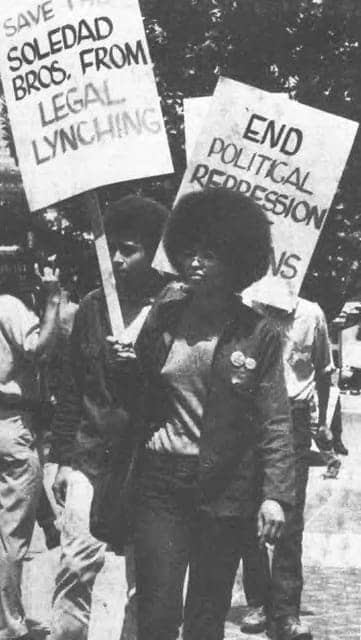
Of course, when it finally becomes more attractive for one to fight, and perhaps die, than to live in a survival mode, revolution starts to become a possibility. Not a riot, not a government takeover by one or another group, but a people’s revolution led by the politically conscious.
This consciousness doesn’t simply appear. Individuals must grow and work into it, but it’s an invaluable gift to have insight into and access to an alternative to the frustration, a goal on the horizon.
The ‘90s are an unconscious era. The unimportant is all-important, the essential neglected. What system than capitalism, what time period than now, is better suited to naturally create the scapegoat, the seldom-heard political prisoner, misunderstood in his cult-of-personality status, held back in a chokehold from society? It is not only our right, but our duty, to listen to and comprehend George Jackson’s message. To not do so is to turn our backs on one of the brilliant minds of the 20th century, an individual passionately involved with liberating not only himself, but all of us.
It is not only our right, but our duty, to listen to and comprehend George Jackson’s message. To not do so is to turn our backs on one of the brilliant minds of the 20th century, an individual passionately involved with liberating not only himself, but all of us.
“Settle your quarrels, come together, understand the reality of our situation, understand that fascism is already here, that people are dying who could be saved, that generations more will die or live poor butchered half-lives if you fail to act. Do what must be done, discover your humanity and your love in revolution. Pass on the torch. Join us, give up your life for the people.” – George Jackson
Jonathan Jackson Jr. wrote this essay in San Francisco in June 1994 to serve as the foreword to the edition of George Jackson’s “Soledad Brother” published that year.

 Store
Store


